Monographs by Thomas Joseph White
Exodus recounts the origins of ancient Israel, but it is also a book of religious symbols. How sh... more Exodus recounts the origins of ancient Israel, but it is also a book of religious symbols. How should it be interpreted, especially in light of modern historical-critical study? In this addition to an acclaimed series, a respected scholar offers a theological reading of Exodus that highlights Aquinas's interpretations of the text. As with other volumes in the series, this commentary is ideal for those called to ministry, serving as a rich resource for preachers, teachers, students, and study groups.

In recent years, Thomistic thought has seen a noteworthy revival, especially in the domain of sys... more In recent years, Thomistic thought has seen a noteworthy revival, especially in the domain of systematic and historical theology. This resurgence of interest in Aquinas' thought is beginning to significantly affect the shape of academic theology as well as ecumenical theology. Yet there exists no serious study of Thomistic Christology, especially in dialogue with major themes in modern Christology. The Incarnate Lord, then, considers central themes in Christology from a metaphysical perspective. Particular attention is given to the hypostatic union, the two natures of Christ, the knowledge and obedience of Jesus, the passion and death of Christ, his descent into hell, and resurrection. A central concern of the book is to argue for the perennial importance of ontological principles of Christology inherited from patristic and scholastic authors. However, the book also seeks to advance an interpretation of Thomistic Christology in a modern context. The teaching Aquinas, then, is central to the study, but it is placed in conversation with various modern theologians, such as Karl Barth, Karl Rahner and Hans Urs von Balthasar. Ultimately the goal of the work is to suggest how traditional Catholic theology might thrive under modern conditions, and also develop fruitfully from engaging in contemporary controversies. The first part of the book, then, examines the ontology of the hypostatic union, the grace and human nature of Christ, the analogical similitude of the human and divine natures of Jesus, and the human knowledge and obedience of Christ. The second part of the book considers the obedient self-offering of Christ, his cry of dereliction,suffering and death, as well as his descent into hell, and physical resurrection. The conclusion of the book provides a systematic reflection on the nature of Christology as a theoretical and historical discipline.
This book considers the merits of Thomas Aquinas's arguments for the existence of God. Aquinas po... more This book considers the merits of Thomas Aquinas's arguments for the existence of God. Aquinas portrays philosophical reason as a form of wisdom that can attain to true knowledge of God. Should his views matter for contemporary Christian theology? What are the Aristotelian presuppositions required for these arguments to make sense, and are such presuppositions rationally defensible today? Particularly, should the modern Kantian and Heideggerian objections to any possible philosophical approach to God (as onto-theology) apply to the arguments of Aquinas? The author argues robustly in favor of the recovery of a sapiential conception of Thomistic philosophy.
Edited Volumes by Thomas Joseph White
Thomas Aquinas and Karl Barth are often taken to be two of the greatest theologians in the Christ... more Thomas Aquinas and Karl Barth are often taken to be two of the greatest theologians in the Christian tradition. This book undertakes a systematic comparison of them through the lens of five key topics: (1) the being of God, (2) Trinity, (3) Christology, (4) grace and justification, and (5) covenant and law. Under each of these headings, a Catholic portrait of Aquinas is presented in comparison with a Protestant portrait of Barth, with the theological places of convergence and contrast highlighted.
This volume combines a deep commitment to systematic theology with an equally profound commitment to mutual engagement. Understood rightly and well, Aquinas and Barth contribute powerfully to the future of theology and to an ecumenism that takes doctrinal confession seriously while at the same time seeking unity among Christians.
Proceedings of a conference held in Apr. 2008 in Washington, D.C.
A selection of essays that consider how God's suffering or lack thereof can relate to our redempt... more A selection of essays that consider how God's suffering or lack thereof can relate to our redemption from and through human suffering. The contributors - Catholic, Protestant, and Orthodox - tread carefully but surely over this thorny ground, defending diverse and often opposing perspectives.
Journal Articles by Thomas Joseph White
As Hegel noted, the human mind aspires naturally to the universal, even through all the dialectic... more As Hegel noted, the human mind aspires naturally to the universal, even through all the dialectical turns of history, aiming at it like a kind of star in the night. Human culture is composed of a diversity of tribal genealogies, incompatible legal customs, competing philosophical systems, and contrasting religious claims. And at the same time, the human race strives incessantly to find an all-encompassing truth, one that holds for all persons and for all time. In fact, only this aspiration accounts for the generation of such diverse monuments of culture that are themselves so contrasting. Only the universal can quench the living thirst of the mind.
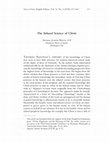
Thomas Aquinas's theory of the knowledge of Christ may seem to have little relevance for modern h... more Thomas Aquinas's theory of the knowledge of Christ may seem to have little relevance for modern historical-critical study of the figure of Jesus of Nazareth. 1 In his mature work, represented emblematically by the third part of the Summa theologiae, Aquinas presents the knowledge of Christ in a fourfold descending perspective from the highest forms of knowledge to the most basic. He begins from the divine wisdom that Christ possesses as God and then examines three modes of human knowledge: the immediate vision of God that Christ possesses in his human soul, the infused science that Jesus possesses as the most perfect of the prophets, and the acquired knowledge that Christ possesses as man in virtue of the human nature that he shares with us. 2 Aquinas's account stems originally from the Chalcedonian principles of Christological doctrine. The approach might be broadly characterized as a form of " descending Christology " insofar as the deity and divine wisdom of the Lord are presupposed and his human acquired knowledge is affirmed just insofar as he is essentially human. Meanwhile, the beatific vision and infused science of Christ are interpreted as graces given to his human nature in view of his human actions on behalf of our salvation. It is due to his beatific vision and his infused prophetic knowledge, for example, that Christ as man is able to 1
This is a recently published essay on the right to religious freedom, employing both Dignitatis H... more This is a recently published essay on the right to religious freedom, employing both Dignitatis Humanae and the metaphysics and anthropology of Thomas Aquinas.

In this essay I would like to consider in three stages the topic of the Virgin Mary as a model of... more In this essay I would like to consider in three stages the topic of the Virgin Mary as a model of ecclesial faith. I will do so by recourse to themes found in the doctrine of grace of Thomas Aquinas, especially as it relates to the unfolding of the divine economy. In the first part of the essay I will consider Aquinas’s doctrine of faith in three respects: in terms of the teleology of
faith, its ontological degrees of perfection, and its communal character. In the second part of the essay I will consider more briefly the anthropological process of development in faith as it is related to love, particularly with regard to the question: how can faith grow through the occasions of joy and suffering? In the third part of the essay I will consider three mysteries of the
life of the Virgin Mary, with respect to her faith: her divine maternity at the Annunciation, her meritorious compassion at the Cross, and her divine queenship in the Assumption, at the term of her earthly sojourn in faith. The goal is to show in these three mysteries how the characteristics of faith elaborated in part one of the essay (which are common to all the faithful)
are exemplified in the life of the Virgin Mary, who, like all other Christians, grew in faith both through joy and through suffering. However, these same mysteries of grace are also expressed or realized in her in an absolutely unique mode, one that is not partaken of by another person in the divine economy. As I will argue in conclusion, however, the uniqueness of the Virgin Mary is not something purely extrinsic to the ecclesial life of believers. On the contrary, her prerogatives are intrinsically related to the ecclesial communion of the Church. They are various ways that she affects the lives of all believers, shining forth simultaneously as the Mother of the Redeemer and the Mother of all the faithful.

There are two competing narratives that most strongly have marked modern theology in its quest to... more There are two competing narratives that most strongly have marked modern theology in its quest to interpret the history of theologies of grace and nature. Both of these narratives posit a dichotomy of extremes, so to speak, through which orthodoxy must pass. On the one hand there is the influential narrative of Karl Barth, who posits a vision of grace-nature orthodoxy that is Reformed, and that claims to pass between the extremes of liberal Protestantism and Roman Catholicism. On the other
hand there is the narrative of Henri de Lubac, who posits a vision of grace-nature orthodoxy that purports to be Augustinian, and that passes between the extremes of the naturalist extrinsicism of Cajetan and Suarez on the one side and the integralist views of Baius and Jansenius on the other. These two visions attempt conceptually to do different things and in fact are in some fundamental ways deeply opposed to each other. Thinkers of the generation that followed Barth and de Lubac were deeply influenced by one or both of them; those subsequent thinkers sought in various ways to maintain a via media between truths found in their respective theories. We see this notably in the writings of Karl Rahner, Hans Urs von Balthasar, Gottlieb Söhngen, and Joseph Ratzinger. Nevertheless, what I would like to do in this essay is to introduce briefly the respective views of Barth and de Lubac in order to compare them in turn with the grace-nature paradigm of the young Matthias Joseph Scheeben, in his early work, entitled Natur und Gnade. (This work was published in 1861 when Scheeben was twenty-six.) What, according to Scheeben, are the extremes to be avoided in the domain of the doctrine of grace-nature relations, and how should we understand the
history of orthodoxy? What I will argue is twofold: First, Scheeben has a more profound and comprehensive vision of the composition of orthodoxy in this domain than either Barth or de Lubac. Second, his scholasticism is not a deficit, hindering his capacity to articulate an insightful narrative history of orthodoxy, but is rather the presupposition of its success.

I will proceed in three parts: First, I will consider briefly the classic dispute between Luther ... more I will proceed in three parts: First, I will consider briefly the classic dispute between Luther and Cajetan on the power of the keys, with the goal of clarifying the ecclesiological nature of the sacrament of penance. Second, I will discuss a widespread modern Catholic consideration of the sacrament that misunderstands the nature of the juridical power of absolution by making it something virtually accessory to our reconciliation with God. Third, I will consider Aquinas’s teaching on the ecclesial dimension of the sacrament of reconciliation as a way of thinking about the relation between the priesthood and the Church. My basic argument is the following: The intrinsic form that all grace takes in the Christian economy of salvation is not only Christological but inherently sacramental and ecclesial. In the sacrament of penance, this grace provides entry into the communion of the Church and therefore renders Christ’s salvific action in the world effective in an irreplaceable way. Such juridical agency endures eschatologically, because reception of the sacrament of forgiveness from a rightly delegated minister entails an inchoate participation in the final judgment of Christ in his glory, and Christ’s judgment of mercy has everlasting ecclesial effects upon which we will be eternally dependent.

I would like to consider two areas of controversy surrounding the “harmony” of these two poles (n... more I would like to consider two areas of controversy surrounding the “harmony” of these two poles (natural aspirations answered by Christian life and Christological, graced fulfillment of nature) in the document.The two topics (which can be considered in the
form of questions) are the following: Ought we to follow what has become a standard post-conciliar trend in rejecting a theological concept of “pure nature,” so as to make sense of the theology of Gaudium et spes §22? How does this question relate to a corresponding articulation of a natural desire for God in the historical life of man under grace? Second, what does it mean to affirm the Christological fulfillment of human
nature in history? What metaphysical presuppositions are present or absent in the claim, as regards the intrinsically historical character of nature as such? In each case, I will consider briefly a major interpreter of the Council’s theology who wrote in the years just after the Council (Karl Rahner, and Marie-Dominique Chenu), and then offer critical reflections on their respective claims. In the last section of the essay, I appeal to Thomistic considerations on the relations of nature, grace, and Christology, thereby suggesting some principles for interpreting the conciliar teaching in what I take to be a theologically constructive and reasonable way. The basic argument of the essay is the following: Without a properly understood concept of pure nature, it is impossible to
claim (1) that moral evil (which is prevalent in human nature in its actual state) is in truth unnatural, and (2) that we can only become perfectly human (with a restored nature) by the grace of Christ. (3) What is true for human nature in general is the case in a unique way concerning Christ.To conceive of Christ as truly and perfectly human by contrast and comparison with ourselves requires a mediating concept of pure nature.Without such a concept we cannot rightly articulate why Christ is the fulfillment of what it means to be human.

In this essay I will not focus on the philosophical questions of Thomism and the Kantian critique... more In this essay I will not focus on the philosophical questions of Thomism and the Kantian critique of metaphysics, important though these may be. Instead, I would like to briefly re-present Spencer’s distinctly theological objections to Aquinas’s theories of causality, especially creative causality by God, as he understands them in light of the criticisms of Barth and Eberhard Jüngel.Then, I would like to respond in two stages. First I will examine Barth’s theological objections to Aquinas’s theory of causality, and show why a number of these are either inaccurate, or theologically problematic. I will contrast Aquinas’s theory of creative causality, and non-generic, analogical predication with Barth’s own description of “Thomistic” thought, and will argue that in fact, only if one has a theory of analogical predication like the one Aquinas develops can one avoid the kind of generic assimilations of God to creatures that Barth himself (falsely) criticizes Aquinas for making. Aquinas offers clear solutions to a problem that Barth seems to have resolved only partially, and imperfectly. In fact, given his theoretical statements about analogy theory, it is inevitably Barth, and not Aquinas, who is in danger of assimilating God and creatures to a generically common set of features in a conceptually anthropomorphic fashion.
Second, I wish to turn to the more fundamental theological question that Spencer’s criticisms raise.Why should Kant’s critique of causality help advance a theological program that wishes to be genuinely Christocentric, both ontologically and epistemologically? Kant, after all, offers arguments against the intelligibility and possibility of the Incarnation and the existence of grace that stem directly (and logically) from his epistemological presuppositions. Here in particular I will argue that the absence of a sense of the analogical causality of the Creator endangers, rather than accentuates, a true understanding of Christ as God, particularly as concerns right reflection on the “divine nature,” or “essence,” of Christ as distinct from his human nature. In fact, the Thomistic sense of analogy and causality serve precisely to understand the transcendence and otherness of the divine nature as unlike human nature, but also the intelligibility of human nature as like the divine nature. This is something Barth’s critique of Aquinas does not grasp adequately, but which is in fact essential for defending Chalcedonian doctrine against Kant’s arguments against the Incarnation.The reason for this is that such a view permits us to rightly understand the freedom of the divine nature to be present in humanity without rivalry to human freedom not despite but because of its transcendence, but also the capacity of human nature to receive the divine revelation due to its likeness to the divine nature, yet without being able in any way to anticipate or procure that presence. In short, Aquinas’s doctrine of analogical causality offers us crucial resources by which to respond to Kantian criticisms of Christianity in ways that Barthian thought does not.

I will examine two basic ideas in Barth’s treatment of divine obedience in Church Dogmatics, IV, ... more I will examine two basic ideas in Barth’s treatment of divine obedience in Church Dogmatics, IV, 1, section 59.The first is his affirmation that God is able to exist in the man Jesus Christ as one who is humble and obedient and that he does this without ceding his immutability, eternity, and omnipotence. In other
words, God can take on the attributes of lowliness and service without ceasing to be the sovereign Lord of his creation.The second idea is that obedience, found in the man Jesus, in fact has its condition of possibility in a transcendent “pretemporal” obedience in the immanent life of the Trinity. God the Son is in some sense eternally obedient to God the Father, and this is the ontological “presupposition” for the Incarnation.
I will argue that the first of these ideas can be understood as
profoundly consistent with a classical understanding of Chalcedonian Christology (represented here by Aquinas). I will argue that the second idea, however, is problematic for two reasons. As it is stated by Barth, the theory seems to suggest that obedience characterizes the procession of the Son from the Father.4 If this is the case, then the positing of such obedience in God renders obscure the confession of the unity of the divine will and power of God. Consequently, it would also make problematic the affirmation of a divine immutable omnipotence present in the incarnate Son. If this is the case, then, the second idea of Barth is in some real tension with the first one mentioned above, resulting in a kind of “Trinitarian
antinomy.”There is an inevitable discord between the affirmation that the eternal, wise, and omnipotent God became human, and the affirmation that there is obedience within the very life of God that characterizes the person of the Son as distinct from the Father.
A more benign (re)interpretation of Barth’s pre-temporal obedience is possible, however. If we understand the Son’s pretemporal obedience as pertaining to his mission to become incarnate, received from the Father, then continuity between Barth’s two ideas is possible. According to classical Nicene orthodoxy, God the Word receives and possesses from the
Father the unique divine nature, power, and will of God from all eternity. This personal “relationality” of the Word implies a “receptivity” of the divine nature without any ontological subordination or dependence. Extrapolating from this view one can affirm that the Son’s divine receptivity is the transcendent ontological foundation for his temporal mission among human beings. It is the Son as God who wills to become incarnate, yet he wills this mission not only with but also from the Father. Because this receptivity (as proceeding from the Father) characterizes his very person, he can be obedient in and through his human actions in a characteristically filial way, that is to say, as the Son made man. His human obedience thus reveals his eternal, personal relativity to the Father.
This latter perspective does not imply any real multiplicity of wills in God, nor an obedience in God “according to his divine nature.” It certainly does not imply ontological dependency of creature to creator. Rather, it predicates “obedience” to the pre-incarnate Word uniquely in a figurative or metaphorical sense, as denoting improperly what is in fact the transcendent divine receptivity proper to eternal generation. Despite the fact that this “Thomistic” interpretation contradicts some of Barth’s
explicit statements, it nevertheless renders certain of Barth’s influential intuitions more internally coherent, and permits an interpretation of his theology more consistent with the classical Christological tradition.

In this essay I would like to draw some theological and biblical parameters for thinking rightly ... more In this essay I would like to draw some theological and biblical parameters for thinking rightly about the death cry of Christ and its theological significance. In the first part of the essay, I will appeal to theological reflections from Aquinas to argue that the final cry of Christ on the cross cannot be interpreted as either a cry of despair or of spiritual separation from God. By contrast, it ought to be understood theologically as a prayer of desire related to Christ’s abandonment to the Father and his hope to introduce humanity into the eschatological gift of redemption. In the second part of the essay (drawing on the exegetical work of M. J. Lagrange, Rudolph Schnackenburg, and Raymond Brown among others) I will compare the final words of Christ in Mark with the “cry of thirst” that is its equivalent in John’s Gospel (19:28). In doing so, I will explore three theological parallels that exist in both traditions and will argue that these reveal a common theological core present in the very different perspectives of the two evangelists. I will argue that the cry of Christ as portrayed in each of these traditions implies the presence of both expectation and agony, and has explicitly eschatological overtones. It is seen to usher in a new age of redemption that has already begun at Golgotha. In the third part of the essay I will return to Aquinas, and his theory of the “economic mode” of the beatific vision of the earthly Christ. Here I will argue that the “mixed state” of expectation and suffering previously discussed is entirely compatible with (and in fact complementary to) the teaching of St.Thomas concerning Christ’s knowledge of both the Father and sinful humanity in and through his crucifixion.
Essentially my argument will be this: God upholds all creatures in being and offers to all human ... more Essentially my argument will be this: God upholds all creatures in being and offers to all human beings (in diverse fashions) the grace that renders possible their salvation. If this grace is effective in them, the primary cause of their salvation is God; if a creature refuses this grace by withdrawing from it (and persisting in this state), it alone is the “cause” of its eternal loss. Aquinas’s theology of the antecedent and consequent will of God as it is appropriated by Charles Journet allows us to speak credibly of this mystery in the terms I have alluded to above. Hans Urs von Balthasar’s rejection of this same distinction causes his thought to tend inevitably toward a doctrine of necessary universal salvation (apokatastasis panton).
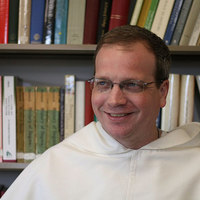



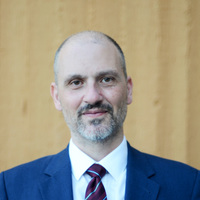
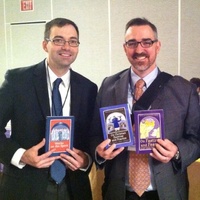

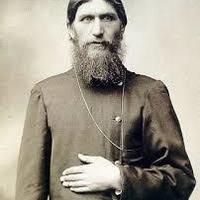



Uploads
Monographs by Thomas Joseph White
Edited Volumes by Thomas Joseph White
This volume combines a deep commitment to systematic theology with an equally profound commitment to mutual engagement. Understood rightly and well, Aquinas and Barth contribute powerfully to the future of theology and to an ecumenism that takes doctrinal confession seriously while at the same time seeking unity among Christians.
Journal Articles by Thomas Joseph White
faith, its ontological degrees of perfection, and its communal character. In the second part of the essay I will consider more briefly the anthropological process of development in faith as it is related to love, particularly with regard to the question: how can faith grow through the occasions of joy and suffering? In the third part of the essay I will consider three mysteries of the
life of the Virgin Mary, with respect to her faith: her divine maternity at the Annunciation, her meritorious compassion at the Cross, and her divine queenship in the Assumption, at the term of her earthly sojourn in faith. The goal is to show in these three mysteries how the characteristics of faith elaborated in part one of the essay (which are common to all the faithful)
are exemplified in the life of the Virgin Mary, who, like all other Christians, grew in faith both through joy and through suffering. However, these same mysteries of grace are also expressed or realized in her in an absolutely unique mode, one that is not partaken of by another person in the divine economy. As I will argue in conclusion, however, the uniqueness of the Virgin Mary is not something purely extrinsic to the ecclesial life of believers. On the contrary, her prerogatives are intrinsically related to the ecclesial communion of the Church. They are various ways that she affects the lives of all believers, shining forth simultaneously as the Mother of the Redeemer and the Mother of all the faithful.
hand there is the narrative of Henri de Lubac, who posits a vision of grace-nature orthodoxy that purports to be Augustinian, and that passes between the extremes of the naturalist extrinsicism of Cajetan and Suarez on the one side and the integralist views of Baius and Jansenius on the other. These two visions attempt conceptually to do different things and in fact are in some fundamental ways deeply opposed to each other. Thinkers of the generation that followed Barth and de Lubac were deeply influenced by one or both of them; those subsequent thinkers sought in various ways to maintain a via media between truths found in their respective theories. We see this notably in the writings of Karl Rahner, Hans Urs von Balthasar, Gottlieb Söhngen, and Joseph Ratzinger. Nevertheless, what I would like to do in this essay is to introduce briefly the respective views of Barth and de Lubac in order to compare them in turn with the grace-nature paradigm of the young Matthias Joseph Scheeben, in his early work, entitled Natur und Gnade. (This work was published in 1861 when Scheeben was twenty-six.) What, according to Scheeben, are the extremes to be avoided in the domain of the doctrine of grace-nature relations, and how should we understand the
history of orthodoxy? What I will argue is twofold: First, Scheeben has a more profound and comprehensive vision of the composition of orthodoxy in this domain than either Barth or de Lubac. Second, his scholasticism is not a deficit, hindering his capacity to articulate an insightful narrative history of orthodoxy, but is rather the presupposition of its success.
form of questions) are the following: Ought we to follow what has become a standard post-conciliar trend in rejecting a theological concept of “pure nature,” so as to make sense of the theology of Gaudium et spes §22? How does this question relate to a corresponding articulation of a natural desire for God in the historical life of man under grace? Second, what does it mean to affirm the Christological fulfillment of human
nature in history? What metaphysical presuppositions are present or absent in the claim, as regards the intrinsically historical character of nature as such? In each case, I will consider briefly a major interpreter of the Council’s theology who wrote in the years just after the Council (Karl Rahner, and Marie-Dominique Chenu), and then offer critical reflections on their respective claims. In the last section of the essay, I appeal to Thomistic considerations on the relations of nature, grace, and Christology, thereby suggesting some principles for interpreting the conciliar teaching in what I take to be a theologically constructive and reasonable way. The basic argument of the essay is the following: Without a properly understood concept of pure nature, it is impossible to
claim (1) that moral evil (which is prevalent in human nature in its actual state) is in truth unnatural, and (2) that we can only become perfectly human (with a restored nature) by the grace of Christ. (3) What is true for human nature in general is the case in a unique way concerning Christ.To conceive of Christ as truly and perfectly human by contrast and comparison with ourselves requires a mediating concept of pure nature.Without such a concept we cannot rightly articulate why Christ is the fulfillment of what it means to be human.
Second, I wish to turn to the more fundamental theological question that Spencer’s criticisms raise.Why should Kant’s critique of causality help advance a theological program that wishes to be genuinely Christocentric, both ontologically and epistemologically? Kant, after all, offers arguments against the intelligibility and possibility of the Incarnation and the existence of grace that stem directly (and logically) from his epistemological presuppositions. Here in particular I will argue that the absence of a sense of the analogical causality of the Creator endangers, rather than accentuates, a true understanding of Christ as God, particularly as concerns right reflection on the “divine nature,” or “essence,” of Christ as distinct from his human nature. In fact, the Thomistic sense of analogy and causality serve precisely to understand the transcendence and otherness of the divine nature as unlike human nature, but also the intelligibility of human nature as like the divine nature. This is something Barth’s critique of Aquinas does not grasp adequately, but which is in fact essential for defending Chalcedonian doctrine against Kant’s arguments against the Incarnation.The reason for this is that such a view permits us to rightly understand the freedom of the divine nature to be present in humanity without rivalry to human freedom not despite but because of its transcendence, but also the capacity of human nature to receive the divine revelation due to its likeness to the divine nature, yet without being able in any way to anticipate or procure that presence. In short, Aquinas’s doctrine of analogical causality offers us crucial resources by which to respond to Kantian criticisms of Christianity in ways that Barthian thought does not.
words, God can take on the attributes of lowliness and service without ceasing to be the sovereign Lord of his creation.The second idea is that obedience, found in the man Jesus, in fact has its condition of possibility in a transcendent “pretemporal” obedience in the immanent life of the Trinity. God the Son is in some sense eternally obedient to God the Father, and this is the ontological “presupposition” for the Incarnation.
I will argue that the first of these ideas can be understood as
profoundly consistent with a classical understanding of Chalcedonian Christology (represented here by Aquinas). I will argue that the second idea, however, is problematic for two reasons. As it is stated by Barth, the theory seems to suggest that obedience characterizes the procession of the Son from the Father.4 If this is the case, then the positing of such obedience in God renders obscure the confession of the unity of the divine will and power of God. Consequently, it would also make problematic the affirmation of a divine immutable omnipotence present in the incarnate Son. If this is the case, then, the second idea of Barth is in some real tension with the first one mentioned above, resulting in a kind of “Trinitarian
antinomy.”There is an inevitable discord between the affirmation that the eternal, wise, and omnipotent God became human, and the affirmation that there is obedience within the very life of God that characterizes the person of the Son as distinct from the Father.
A more benign (re)interpretation of Barth’s pre-temporal obedience is possible, however. If we understand the Son’s pretemporal obedience as pertaining to his mission to become incarnate, received from the Father, then continuity between Barth’s two ideas is possible. According to classical Nicene orthodoxy, God the Word receives and possesses from the
Father the unique divine nature, power, and will of God from all eternity. This personal “relationality” of the Word implies a “receptivity” of the divine nature without any ontological subordination or dependence. Extrapolating from this view one can affirm that the Son’s divine receptivity is the transcendent ontological foundation for his temporal mission among human beings. It is the Son as God who wills to become incarnate, yet he wills this mission not only with but also from the Father. Because this receptivity (as proceeding from the Father) characterizes his very person, he can be obedient in and through his human actions in a characteristically filial way, that is to say, as the Son made man. His human obedience thus reveals his eternal, personal relativity to the Father.
This latter perspective does not imply any real multiplicity of wills in God, nor an obedience in God “according to his divine nature.” It certainly does not imply ontological dependency of creature to creator. Rather, it predicates “obedience” to the pre-incarnate Word uniquely in a figurative or metaphorical sense, as denoting improperly what is in fact the transcendent divine receptivity proper to eternal generation. Despite the fact that this “Thomistic” interpretation contradicts some of Barth’s
explicit statements, it nevertheless renders certain of Barth’s influential intuitions more internally coherent, and permits an interpretation of his theology more consistent with the classical Christological tradition.
This volume combines a deep commitment to systematic theology with an equally profound commitment to mutual engagement. Understood rightly and well, Aquinas and Barth contribute powerfully to the future of theology and to an ecumenism that takes doctrinal confession seriously while at the same time seeking unity among Christians.
faith, its ontological degrees of perfection, and its communal character. In the second part of the essay I will consider more briefly the anthropological process of development in faith as it is related to love, particularly with regard to the question: how can faith grow through the occasions of joy and suffering? In the third part of the essay I will consider three mysteries of the
life of the Virgin Mary, with respect to her faith: her divine maternity at the Annunciation, her meritorious compassion at the Cross, and her divine queenship in the Assumption, at the term of her earthly sojourn in faith. The goal is to show in these three mysteries how the characteristics of faith elaborated in part one of the essay (which are common to all the faithful)
are exemplified in the life of the Virgin Mary, who, like all other Christians, grew in faith both through joy and through suffering. However, these same mysteries of grace are also expressed or realized in her in an absolutely unique mode, one that is not partaken of by another person in the divine economy. As I will argue in conclusion, however, the uniqueness of the Virgin Mary is not something purely extrinsic to the ecclesial life of believers. On the contrary, her prerogatives are intrinsically related to the ecclesial communion of the Church. They are various ways that she affects the lives of all believers, shining forth simultaneously as the Mother of the Redeemer and the Mother of all the faithful.
hand there is the narrative of Henri de Lubac, who posits a vision of grace-nature orthodoxy that purports to be Augustinian, and that passes between the extremes of the naturalist extrinsicism of Cajetan and Suarez on the one side and the integralist views of Baius and Jansenius on the other. These two visions attempt conceptually to do different things and in fact are in some fundamental ways deeply opposed to each other. Thinkers of the generation that followed Barth and de Lubac were deeply influenced by one or both of them; those subsequent thinkers sought in various ways to maintain a via media between truths found in their respective theories. We see this notably in the writings of Karl Rahner, Hans Urs von Balthasar, Gottlieb Söhngen, and Joseph Ratzinger. Nevertheless, what I would like to do in this essay is to introduce briefly the respective views of Barth and de Lubac in order to compare them in turn with the grace-nature paradigm of the young Matthias Joseph Scheeben, in his early work, entitled Natur und Gnade. (This work was published in 1861 when Scheeben was twenty-six.) What, according to Scheeben, are the extremes to be avoided in the domain of the doctrine of grace-nature relations, and how should we understand the
history of orthodoxy? What I will argue is twofold: First, Scheeben has a more profound and comprehensive vision of the composition of orthodoxy in this domain than either Barth or de Lubac. Second, his scholasticism is not a deficit, hindering his capacity to articulate an insightful narrative history of orthodoxy, but is rather the presupposition of its success.
form of questions) are the following: Ought we to follow what has become a standard post-conciliar trend in rejecting a theological concept of “pure nature,” so as to make sense of the theology of Gaudium et spes §22? How does this question relate to a corresponding articulation of a natural desire for God in the historical life of man under grace? Second, what does it mean to affirm the Christological fulfillment of human
nature in history? What metaphysical presuppositions are present or absent in the claim, as regards the intrinsically historical character of nature as such? In each case, I will consider briefly a major interpreter of the Council’s theology who wrote in the years just after the Council (Karl Rahner, and Marie-Dominique Chenu), and then offer critical reflections on their respective claims. In the last section of the essay, I appeal to Thomistic considerations on the relations of nature, grace, and Christology, thereby suggesting some principles for interpreting the conciliar teaching in what I take to be a theologically constructive and reasonable way. The basic argument of the essay is the following: Without a properly understood concept of pure nature, it is impossible to
claim (1) that moral evil (which is prevalent in human nature in its actual state) is in truth unnatural, and (2) that we can only become perfectly human (with a restored nature) by the grace of Christ. (3) What is true for human nature in general is the case in a unique way concerning Christ.To conceive of Christ as truly and perfectly human by contrast and comparison with ourselves requires a mediating concept of pure nature.Without such a concept we cannot rightly articulate why Christ is the fulfillment of what it means to be human.
Second, I wish to turn to the more fundamental theological question that Spencer’s criticisms raise.Why should Kant’s critique of causality help advance a theological program that wishes to be genuinely Christocentric, both ontologically and epistemologically? Kant, after all, offers arguments against the intelligibility and possibility of the Incarnation and the existence of grace that stem directly (and logically) from his epistemological presuppositions. Here in particular I will argue that the absence of a sense of the analogical causality of the Creator endangers, rather than accentuates, a true understanding of Christ as God, particularly as concerns right reflection on the “divine nature,” or “essence,” of Christ as distinct from his human nature. In fact, the Thomistic sense of analogy and causality serve precisely to understand the transcendence and otherness of the divine nature as unlike human nature, but also the intelligibility of human nature as like the divine nature. This is something Barth’s critique of Aquinas does not grasp adequately, but which is in fact essential for defending Chalcedonian doctrine against Kant’s arguments against the Incarnation.The reason for this is that such a view permits us to rightly understand the freedom of the divine nature to be present in humanity without rivalry to human freedom not despite but because of its transcendence, but also the capacity of human nature to receive the divine revelation due to its likeness to the divine nature, yet without being able in any way to anticipate or procure that presence. In short, Aquinas’s doctrine of analogical causality offers us crucial resources by which to respond to Kantian criticisms of Christianity in ways that Barthian thought does not.
words, God can take on the attributes of lowliness and service without ceasing to be the sovereign Lord of his creation.The second idea is that obedience, found in the man Jesus, in fact has its condition of possibility in a transcendent “pretemporal” obedience in the immanent life of the Trinity. God the Son is in some sense eternally obedient to God the Father, and this is the ontological “presupposition” for the Incarnation.
I will argue that the first of these ideas can be understood as
profoundly consistent with a classical understanding of Chalcedonian Christology (represented here by Aquinas). I will argue that the second idea, however, is problematic for two reasons. As it is stated by Barth, the theory seems to suggest that obedience characterizes the procession of the Son from the Father.4 If this is the case, then the positing of such obedience in God renders obscure the confession of the unity of the divine will and power of God. Consequently, it would also make problematic the affirmation of a divine immutable omnipotence present in the incarnate Son. If this is the case, then, the second idea of Barth is in some real tension with the first one mentioned above, resulting in a kind of “Trinitarian
antinomy.”There is an inevitable discord between the affirmation that the eternal, wise, and omnipotent God became human, and the affirmation that there is obedience within the very life of God that characterizes the person of the Son as distinct from the Father.
A more benign (re)interpretation of Barth’s pre-temporal obedience is possible, however. If we understand the Son’s pretemporal obedience as pertaining to his mission to become incarnate, received from the Father, then continuity between Barth’s two ideas is possible. According to classical Nicene orthodoxy, God the Word receives and possesses from the
Father the unique divine nature, power, and will of God from all eternity. This personal “relationality” of the Word implies a “receptivity” of the divine nature without any ontological subordination or dependence. Extrapolating from this view one can affirm that the Son’s divine receptivity is the transcendent ontological foundation for his temporal mission among human beings. It is the Son as God who wills to become incarnate, yet he wills this mission not only with but also from the Father. Because this receptivity (as proceeding from the Father) characterizes his very person, he can be obedient in and through his human actions in a characteristically filial way, that is to say, as the Son made man. His human obedience thus reveals his eternal, personal relativity to the Father.
This latter perspective does not imply any real multiplicity of wills in God, nor an obedience in God “according to his divine nature.” It certainly does not imply ontological dependency of creature to creator. Rather, it predicates “obedience” to the pre-incarnate Word uniquely in a figurative or metaphorical sense, as denoting improperly what is in fact the transcendent divine receptivity proper to eternal generation. Despite the fact that this “Thomistic” interpretation contradicts some of Barth’s
explicit statements, it nevertheless renders certain of Barth’s influential intuitions more internally coherent, and permits an interpretation of his theology more consistent with the classical Christological tradition.